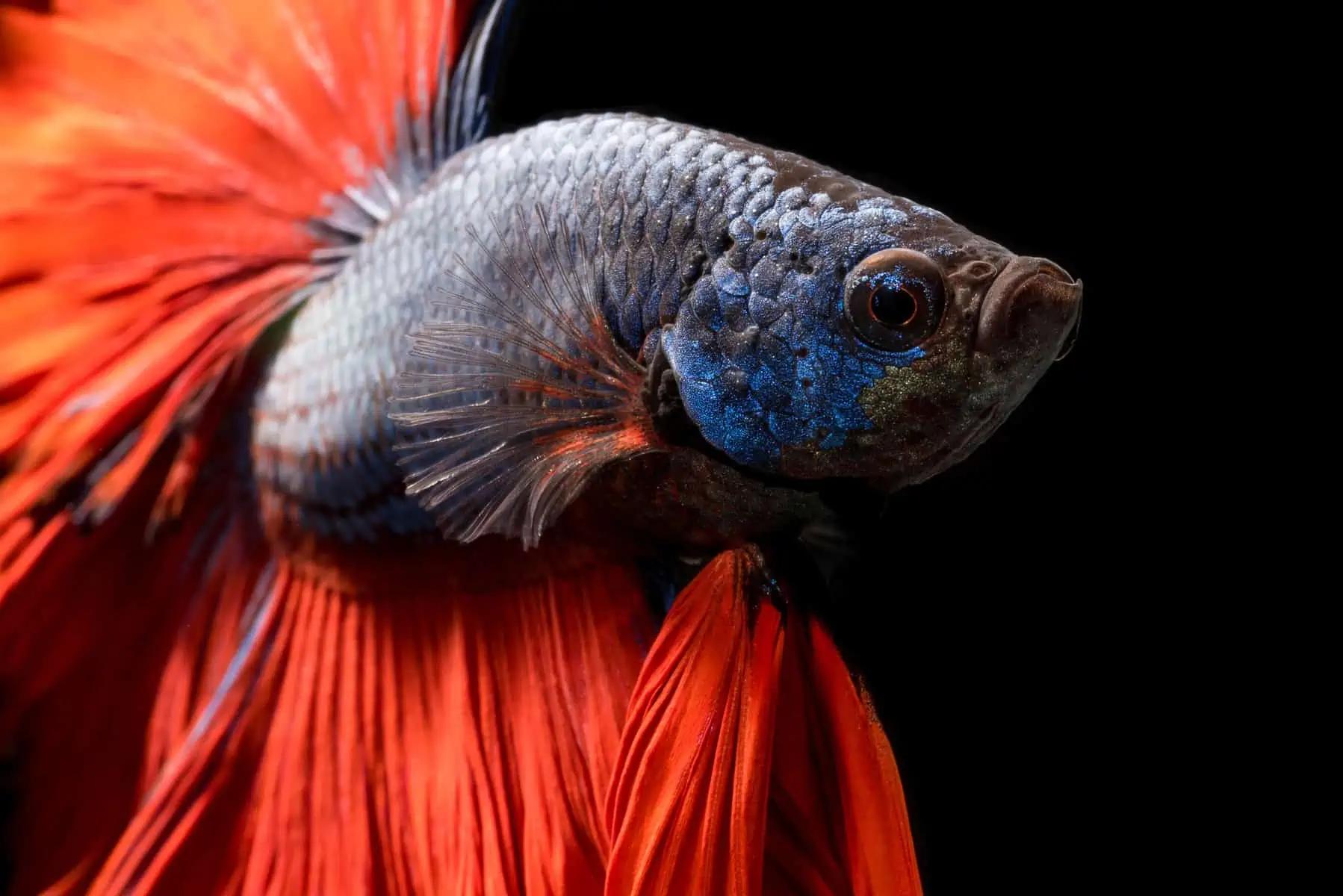An exploded stomach or ruptured organs is a rare, yet fatal condition in betta fish, where massive inflammation and pressure in the abdomen cause vital organs to burst open, with death following soon after.
There are several causes for a burst stomach in betta fish, but luckily, most of them can be prevented or treated before they get too serious.
Here is our guide to exploded stomachs in betta fish, and how you can avoid it happening to your betta!
The Causes of Exploded Stomach in Betta Fish
Bloating
Most cases of a burst stomach will likely be associated with some sort of bloating or dropsy.
Bloating occurs when there’s a digestive problem, organ failure, or infection in the fish and their abdomen fills up with gas or fluid. If these conditions become more acute, the scales on the fish’s belly will begin to protrude like a pine cone and your betta may have trouble swimming normally.
If conditions worsen still, there’s a chance that your betta’s stomach or another organ could rupture, meaning it’s essential to treat bloat or pine coning as quickly as possible.
Treating bloat, however, can be a little tricky because there can be many things causing it.
The condition can be caused by kidney failure, parasite attacks, bacterial infections, as well as plain old constipation, and overfeeding.
Let’s take a closer look at these causes one by one.
Overfeeding and Constipation
Starting with the simplest to treat, many health problems in betta fish can be traced back to overfeeding. Since bettas are phenomenally greedy fish, they’ll happily go on eating even when it’s not good for them.
A betta fish that’s been fed too much may develop pale, stringy feces, and become constipated.
Constipation usually leads to bloat because when the fish is unable to pass solids, gas and fluids can quickly build up inside and make the fish’s abdomen swell and balloon outwards.
Repeated cases of constipation can easily cause swim bladder disease where the fish will lose control of its mobility in the water. If a fish is further neglected, then ruptures could be experienced in your fish’s digestive organs.
Preventing Constipation
Constipation is most easily prevented by a diverse and healthy feeding regime that includes natural foods such as blood worms, daphnia, and brine shrimp, as well as specialized commercial fish foods for bettas.
Only feed your fish twice per day, and not more than your betta can eat in two minutes. Clean up any uneaten food with a net or gravel vacuum, since uneaten food is also a major cause of poor water quality.
Also, never feed your betta fish generic dried fish foods or human foods like bread.
Bettas are chiefly carnivorous fish that need a high-protein diet, and plenty of variation for their guts to remain healthy and happy!
Treating Constipation
To treat constipation, you’ll need to clear your fish’s gut. The first line of fire with this is to fast your betta for a day or two.
If symptoms don’t improve, you could try offering your betta some blanched green peas (cooked in boiling water for up to 1 minute). These act as a mild laxative, which may help your betta to pass solids.
If you find that peas don’t do the trick, you could try giving your betta an Epsom salt bath. Epsom salts are a powerful laxative and will usually clear out anything lodged in your betta’s digestive tract very swiftly.
Kidney Failure
Unlike us, fish don’t have bone marrow to produce our blood cells – their kidneys do it instead!
This makes good kidney function especially important in fish, and if a fish is under constant stress from poor quality water or an inadequate feeding regime, the kidneys are one of the organs that’ll be impacted the most.
If kidneys begin to fail, excessive fluid can quickly build up in the fish’s abdomen, which, in extreme cases, could cause a rupture or an organ to burst.
Treatment
If your fish is extremely bloated and you suspect a kidney problem, your best bet is to improve your tank’s water quality and feeding regime immediately.
Test your water for pH, ammonia, and nitrite levels, perform a large partial water change of 30-50% and vacuum the tank’s gravel thoroughly.
Make sure your aquarium filter is clean and working properly, and that your aquarium heater is set to between 78-81 Fahrenheit.
Offer your fish nutritious, natural foods such as bloodworms and daphnia, and steer clear of any foods containing fillers such as corn or soya.
Unfortunately, kidney diseases are common in bettas that are over 3 years old, and certain kidney conditions such as Polycystic Kidney Disease are simply incurable.
Try to make your betta’s life as comfortable as possible, but if conditions don’t improve, it may be kinder to consider euthanasia rather than leaving your betta in serious distress.
Bacterial Infection

Internal bacterial infections are often some of the most serious diseases in aquarium fish and can cause stomach ulcers as well as acute bloat or dropsy.
Deadly bacterial pathogens such as Staphylococcus aureus may even cause a betta’s digestive tract to burst open.
Bacterial infections sometimes begin on the outside of a fish and work their way inwards. Fin rot bacteria, for example, attack the fins first, but can then progress to the body once the fish is weakened.
External infections can also be detected by a white, slimy coat that develops over the fish’s body or eyes, and red patches or ulcers on the skin.
Purely internal infections, however, can be difficult to spot. You may just notice your fish looking lethargic and uninterested in food.
The situation can deteriorate very quickly, which is why internal bacterial infections are such deadly killers and are much easier to prevent than to cure.
Preventing Bacterial Infections
Bacterial infections usually take hold when fish are living in an unsanitary or stressful environment where their immune systems are weakened and pathogens can thrive.
Once again, your best preventative measure against harmful bacteria diseases is good tank management and making your tank a sanctuary for your fish to relax and feel at home.
Avoid overfeeding, clean the tank and make partial water changes often, to maintain good water quality. Also, including plenty of plants and hiding places for your fish will do wonders for their overall health, well-being, and immunity to diseases.
A well-looked-after betta swimming in clean water is much less likely to contract serious bacterial infections than one that’s neglected in a dirty tank, so good fish keeping and prevention really are better than a cure.
Treating Bacterial Infections
If you spot an external bacterial infection on your fish’s fins or scales, it’s important to act fast to avoid the infection spreading.
In minor cases, simply cleaning the tank and making a partial water change will be enough to improve conditions in favor of your fish so they can shrug off the infection.
If your fish is still struggling after cleaning, however, you may need to use medication to treat the infection.
Antibiotic treatments such as Kanamycin Sulfate or Maracyn II can sometimes be bought over the counter and work rapidly to kill bacterial pathogens.
If antibiotics are unavailable in your region or you prefer more natural remedies, you could also try small quantities of aquarium salt, tea tree oil, or adding substantial quantities of Indian Almond Leaves to your betta tank.
These are, however, less likely to be effective in cases of serious infections.
When it comes to bacterial infections that are purely internal, sadly, symptoms often show up when it’s too late. While antibiotics are your best chance of treating the disease, you may also have to consider euthanasia.
Parasitic Infections
Internal parasites such as Hexamita, Spironucleus, and flatworms such as tapeworms can cause serious swelling to the internal organs of Siamese Fighting Fish that can, in some instances, cause severe internal rupturing.
These tiny creatures live deep inside your betta’s belly, leaching nutrients from its digestive tract, and can cause all kinds of distressing symptoms, such as lateral line erosion, hole-in-head, and dropsy.
As with other types of infections, aquarium parasites thrive much better under poor water conditions and in fish that are stressed or weakened by an injury or trauma.
Preventing Parasitic Diseases
Parasite infections are often transmitted from one fish to another, so it’s essential that when you’re buying new fish only buy healthy-looking individuals, with bright eyes, shiny scales, and erect fins that seem to be in perfect order.
As an extra preventative measure, some aquarists like to keep new fish in a quarantine tank for 2-4 weeks to check for disease symptoms before introducing them to the main tank.
Some parasites, however, will simply lie dormant in an aquarium, waiting to strike a fish that’s been weakened by stress or poor water quality.
In this case, your best line of defense is simply to always keep your fish in optimum condition by scrupulous feeding and cleaning routines and providing a densely planted environment where your fish can truly feel at home.
Treating Parasitic Infections
Parasitic infections are often contagious, so it’s prudent to isolate affected fish in a quarantine or hospital tank.
Treat the infection with specialized anti-parasite medications, according to the parasite (e.g. praziquantel or niclosamide), and only return the fish to the main tank when you’re certain that the infection has cleared up.
Betta Fish Stomach Exploding FAQs
Is a Burst Stomach Common in Betta Fish?
Luckily, an exploded stomach is a very rare occurrence in betta fish, although mild cases of bloat and constipation are rather common, and can normally be attributed to overfeeding or an incorrect diet.
In most cases, a stomach explosion in betta is due to a more serious illness such as a bacterial or parasitic infection.
Is an Exploded Stomach Always Fatal to a Betta Fish?
Sadly, an exploded stomach, or the rupturing of any vital organ within your pet betta fish will invariably lead to death, usually within a few hours.
Since the condition is untreatable, the only way to protect your betta against such an unfortunate death is with good tank management and by treating any diseases that may cause severe inflammation promptly before it’s too late.
Why Does My Betta Fish Have a White Belly?
A bulging, white belly in betta fish is a symptom of dangerous bloating and needs tackling immediately for the condition to clear up.
As we’ve pointed out in the above article, the best first aid you can offer a fish with bloat is clean, fresh water and fasting, followed by mild or strong laxatives as required.
Summary
A stomach explosion or the rupture of an internal organ is a rather gruesome event that is, sadly, invariably fatal in betta fish.
Luckily, many of the conditions that could cause a burst stomach are preventable and treatable, meaning that if you carry out good tank maintenance and a healthy feeding regime, you’re very unlikely to lose your betta fish in such a dramatic way!
To learn more about diseases, diagnoses, and treatments in aquarium fish, check out our health and diseases pages here.


